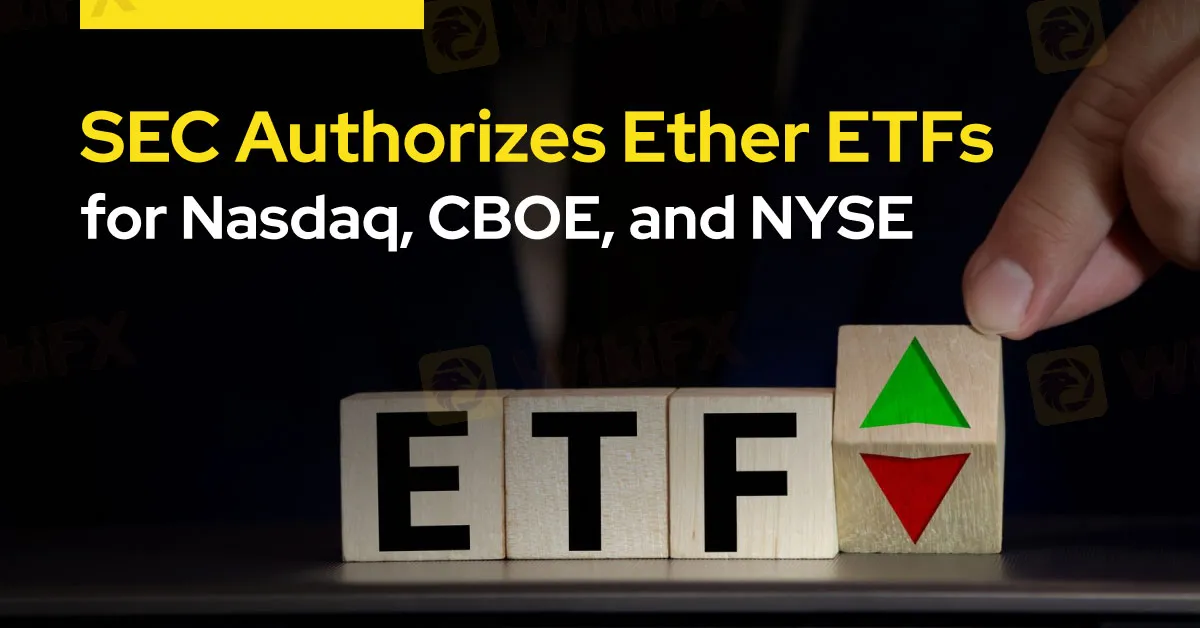简体中文
繁體中文
English
Pусский
日本語
ภาษาไทย
Tiếng Việt
Bahasa Indonesia
Español
हिन्दी
Filippiiniläinen
Français
Deutsch
Português
Türkçe
한국어
العربية
SEC Authorises Ether ETFs for Nasdaq, CBOE, and NYSE
Abstract:The US Securities and Exchange Commission (SEC) has approved applications from major exchanges, including Nasdaq, CBOE, and the NYSE, to list exchange-traded funds (ETFs) tied to the price of ether. This approval potentially paves the way for these products to begin trading later this year.

The US Securities and Exchange Commission (SEC) has approved applications from major exchanges, including Nasdaq, CBOE, and the NYSE, to list exchange-traded funds (ETFs) tied to the price of ether. This approval potentially paves the way for these products to begin trading later this year.
Following the SEC's approval of spot Bitcoin ETFs in January, nine issuers, including VanEck, ARK Investments/21Shares, and BlackRock, applied to launch ETFs tied to ether. Despite this positive development, these applicants must still secure approval for ETF registration statements, which detail investor disclosures, before the funds can commence trading.
The SEC stated that after careful review, the commission found the proposals to be consistent with the Exchange Act and the rules and regulations applicable to a national securities exchange. Specifically, the commission determined that the proposals met the requirements of Section 6(b)(5) of the Exchange Act, which mandates that the Exchanges' rules be designed to prevent fraudulent and manipulative acts and practices and to protect investors and the public interest.

Market participants were bracing for a negative outcome, especially given the SEC's lack of engagement on the applications, Reuters reported. However, in an unexpected turn of events, SEC officials requested the exchanges to make swift adjustments to the filings on Monday, leading to a rush to meet the new requirements in a short timeframe.
Despite the approval, the SEC has not set a deadline for deciding on the registration statements, leaving industry participants uncertain about when trading might commence. Optimism surrounding the SEC's approval of Ether ETFs has already pushed the price of the second-largest cryptocurrency up by 25% on the weekly chart. Notably, asset management firms plan to avoid staking.
Staking is the process of holding funds in a cryptocurrency wallet to support the operations of a blockchain network. Specifically, staking represents an effort to secure a volume and derivatives to address regulatory concerns.
In the run-up to the decision-making deadline, SEC Chair Gary Gensler, known for his scepticism toward cryptocurrencies, declined to comment when reporters inquired about the ether ETFs. A spokesperson from the commission also stated that the agency would not provide further comments on the matter. Earlier, a section of the US Congress had urged Gensler to approve ether ETFs.

Disclaimer:
The views in this article only represent the author's personal views, and do not constitute investment advice on this platform. This platform does not guarantee the accuracy, completeness and timeliness of the information in the article, and will not be liable for any loss caused by the use of or reliance on the information in the article.
Read more

Bybit Shuts Down NFT Marketplace Amid Crypto Market Downturn
Bybit announces the closure of its NFT marketplace, citing efforts to streamline offerings. Discover the latest trends in the declining NFT market and its shift to utility-based growth.

Galaxy Digital Settles $200M in Luna Token Manipulation Case
Galaxy Digital pays $200M to settle Luna token manipulation probe by NY regulators, linked to TerraUSD’s 2022 crash, impacting crypto market stability.

Vanuatu Passes VASP Act to Regulate Crypto and Digital Assets
Vanuatu's new VASP Act regulates crypto businesses, enforcing strict licensing, AML/CFT compliance, and investor protections.

Blockchain Decentralization: Empowering a Trustless Future
In recent years, blockchain technology has rapidly evolved from a niche innovation behind Bitcoin into a transformative force across industries. At its core, blockchain decentralization refers to the distribution of authority and decision-making away from a central entity and into the hands of a distributed network of participants. This shift redefines how data is stored and verified and paves the way for trustless, transparent, and resilient systems that challenge traditional centralized models.
WikiFX Broker
Latest News
The Withdrawal Trap: How Scam Brokers Lure Victims into Paying More
FCA to Investors: Think Twice Before Trusting These Brokers
Trump\s tariffs: How could they affect the UK and your money
Trump gambles it all on global tariffs he\s wanted for decades
TradingView Brings Live Market Charts to Telegram Users with New Mini App
Trump tariffs: How will India navigate a world on the brink of a trade war?
Interactive Brokers Launches Forecast Contracts in Canada for Market Predictions
Authorities Alert: MAS Impersonation Scam Hits Singapore
IG Group Acquires Freetrade for £160M to Expand UK Investment Market
U.S. March ISM Manufacturing PMI Released
Currency Calculator







